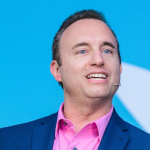Author: Kim Lear
While The Future of Optimization has permeated our culture at large, it is Gen Z that has grown up in era when technology has enabled them to optimize everything from their sleep and their workouts to their study habits and even their intellect. Last year, I interviewed executives who work in the vitamin division of […]
While The Future of Optimization has permeated our culture at large, it is Gen Z that has grown up in era when technology has enabled them to optimize everything from their sleep and their workouts to their study habits and even their intellect.
Last year, I interviewed executives who work in the vitamin division of a large corporation. In each interview I asked, “What are the big trends shaping vitamin sales?” Aside from obvious Covid-related trends, something else came up repeatedly. It went something like this:
“These young customers don’t want to buy a regular multivitamin pulled from the shelf. Noooo. Everyone wants their personalized vitamin packets built just for them.
They couldn’t possibly take a trusted and effective multivitamin! They need a special little packet based on their own special snowflake-like uniqueness.”
I chuckled. Kind of. The snowflake thing. Got it.
As I reflected on The Future of Optimization conversation, I realized that I, a vitamin-taker, have never purchased an off-the-shelf multivitamin.
I don’t consider myself particularly unique; I simply had a blood draw at the doctor’s office after having my second baby and realized that I was low on zinc, magnesium, and vitamin D, but basically good on everything else. I didn’t avoid the multivitamin due to my “uniqueness.”
I did it because a multivitamin isn’t the optimal vitamin for my body.
Personalization is misunderstood. People don’t purchase personalized products because they think of themselves as unique snowflakes. People purchase personalized products because those products happen to be more optimal — more perfect, more useful, and more effective.
Optimization entered mainstream conversation in the early 2000s. A familiar example for some of you may be Tim Ferriss’s books, The 4-Hour Workweek, The 4-Hour Body, and The 4-Hour Chef, all focused on lifestyle optimization. If we implement the right tools, routines, rituals, and habits, Ferriss tells us, our time will be spent more perfectly, more effectively, and more usefully.
While The Future of Optimization has permeated our culture at large, it is Gen Z that has grown up in era when technology has enabled them to optimize everything from their sleep and their workouts to their study habits and even their intellect.
I’ll give you an example: A stationary at-home bike can be a convenient way to work out, but a Peloton can help you optimize your workout by understanding your personal goals, collecting data about your speed and strength, and suggesting programming that will help you not just exercise, but advance. Convenience seeks to eliminate effort; optimization seeks to perfect.
The unintended consequences of this The Future of Optimization obsession are many, and I’ll write about them in another essay. As some of you may already be thinking, our endless quest for self-improvement and perfection has downsides.
For now, we’ll explore the implications for the future.
1. Throughout the pandemic, there have been sentimental conversations about the loss of meaningful workplace interactions. The water-cooler talk, serendipitous conversation, the general white space of in-person work.
However, the traditional workplace also has a lot of meaningless interactions. Distractions, gossip, workplace politics, useless meetings, etc. While much of the white-collar workforce has been working from home, many people have figured out how to optimize their time.
They use 15-minute breaks for exercise, throw laundry in the machine between meetings, spend lunchtime with children, etc. This kind of personal control could continue to reduce tolerance for suboptimal use of time.
2. The Wall Street Journal recently reported on a trend of remote workers taking on two full-time jobs.
There are some ethical issues with this but this idea of “poly-work” was discussed even before most companies were forced to be remote. Some workers are figuring out how to make as much as money as possible by optimizing their tech and their time.
3. Jerry Seinfeld once said in an interview, “Nothing truly great is efficient.” Taking a hard look at optimization presents an opportunity for productive cross-generational mentorship. Seasoned leaders can revisit processes and procedures objectively and explore where opportunities for The Future of Optimization exist.
On the flip side, young employees can be trained to identify the best places for suboptimal experiences. Innovation, creativity, and team culture can have a hard time flourishing in an environment hyper-focused on optimization.
4. Brands can reframe personalization as The Future of Optimization, not specialness. Rather than asking, “How can we make our customer feel special?” Companies can ask, “How can we make this product or service as effective as possible for the people we’re trying to serve?”
The bottom line is: the ability to optimize has already brought us many benefits and consequences are sure to follow, but our societal drive for perfection isn’t going away anytime soon.
The Future of Optimization Article written by Kim Lear and originally published on Inlay Insights
Contact Us at WeSpeak Global and follow us on Twitter
Author Profile
No results available
The articles, video and images embedded on these pages are from various speakers and talent.
These remain the property of its owner and are not affiliated with or endorsed by WeSpeak Global.

It’s hard to believe twenty years have passed since I was honoured and humbled to carry the 2020 Olympic Torch Hindsight to Rekindle Embers of Hope, on the day of the opening ceremonies of the Sydney 2000 Olympics; one of only 26 people before Cathy Freeman lit the cauldron in the stadium. I’d been privileged […]

The pandemic may be easing up in many parts of the world, but its effects will forever shape how we live, work and shop so here are 3 Strategies to Reach Post-COVID Customers The past two years have brought unbelievable challenges and changes. Throughout the uncertainty, people have evaluated their priorities and lifestyles. A full 50% […]

Until someone creates a way to accurately predict the future and Beyond Disruption, there is no way to prepare your business for every change that will come its way and beyond disruption. Whether it is a pandemic that changes the economic outlook, societal trends that change consumption patterns, or machinery or infrastructure that breaks down, […]

We all want to come up with the BIG Little Breakthroughs and the winning idea, solve the challenging problem, or invent something major that will become a staple for generations to come. Under pressure, it’s easy to freeze up and procrastinate. We get the false assumption that the only ideas that are important are the BIG […]

A lot has happened in the past few years since my book, We’re Really All In This Together: Creating a Team Culture of High Performance, Trust, and Belonging, was first published in the spring of 2020. I completed the manuscript for this book (which was just released this week in paperback) at the end of 2019. I […]

How to make change work for you, As human beings, we don’t look at change and think, “Hmmm I want more of that.” Given my own relationship to and with change, I challenged myself to figure out why this is true. Why do we avoid change? Why does change create stress, fear and uncertainty? The […]

What does it mean to be an inspiring leader? An inspirational leader is someone that people follow, if you’re a leader and nobody’s following you, you’re not really a leader or you lack leadership skills. Think of the world’s most inspiring leaders, who are inspiring leaders throughout history? What does it mean to be an inspiring leader? An inspiring leader is someone […]

Ten years ago, I was retrenched from a marketing and sales position. My story is the same as many other people. Sometimes losing a job can point towards a better life and opportunities you never thought possible and now Ten Years as an Entrepreneur. After my retrenchment, I didn’t have an epiphany about starting a […]
No results available
Our Mission
© All rights reserved 2025. Created using VOXEL THEME